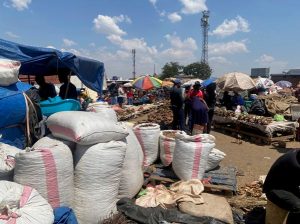Instead of depending on extractive models that focus on exploiting natural resources like land, water and minerals, every African country can benefit from tapping into the voices and wisdom of people who are doing the hard work of preserving African indigenous food. Many rural communities are convinced that achieving food and nutrition security is a policy choice. Some of the questions that are becoming more prominent include what is preventing African government from using money earned from minerals and tourism to document and preserve indigenous food?

Almost all African governments have national frameworks and policies for promoting conventional commodities like hybrid maize, soya and wheat but the same is not happening for indigenous commodities. Why is the preservation of indigenous food being driven by NGOs through food festivals and other interventions that work through selected beneficiaries instead of taking a whole of community approach? How can different structures like political, traditional, religious, government and development agencies structures be used to promote the recognition, support and protection of indigenous food?
Learning from how communities define resilience and wellness
Several African elders know that every community has its own medicinal plants which are an integral part of local resilience. According to the elders, resilience begins from wellness based on indigenous food that has nutrition elements, medicinal elements and other unique food elements. Another critical kind of wellness is in the form of undocumented beliefs or myths that are part of early warnings from the ecosystem. Supporting these issues requires organizing communities and setting up systems that help them to package their knowledge for use in influencing and directing the young generation. That is also how investment opportunities around Indigenous Knowledge Systems (IKS) and indigenous food can contribute to physical development of communities rather than extracting minerals and destroying communities.
Village tourism should be anchored on IKS and indigenous food set up in indigenous knowledge centres. This can be an important step toward a community-based holistic movement in which local people become empowered to find out what has happened to their consumption patterns over the years and start identifying ways of restoring our culture, identity and self-worth through reviving their indigenous food systems. Many investments have been done in communities but what is missing is knitting those investments so that projects do not continue to operate in siloes. An important part of transformation is moving away from the current project approach being pursued by most development agencies to community approach. This is because communities have interlinked layers of wellness and resources which defy the notion of isolated projects.
Rather than using the project approach based on the beneficiary model, community interventions should bring the richness of community layers including what constitutes leadership in a community as well as different roles of leadership. Also important is understanding how communities define skills and cultural practices. These are some of the issues often left out in programming together with beliefs and perceptions. When government and development agencies understand local inhabitants, they begin to acutely make sense of how communities interact with their natural resources given levels of education, academic, non-academic knowledge, in-born traits. When fully understood, that can inform the whole community approach to development.
Making the media relevant to community needs and realities
The consolidation of community information into a platform moves agricultural and rural development content from being a product to a platform which is fluid and inclusive in ways that reach out to the majority of community members like farmers, youth and women. From that angle, agricultural content starts to be based on community needs which form the basis for dialogue and knowledge sharing more than static news events. That way, the media becomes more of an education platform not just a conveyor of news. The main advantage with formal media is that media personnel have expertise in facilitating content generation through skills in interviewing and asking the right questions. There is scope for media personnel to become facilitators of community dialogue. This involves identifying themes and threads around farming and facilitating knowledge sharing the same way virtual workshops and conferences are conducted.
Charles@knowledgetransafrica.com / charles@emkambo.co.zw /
Website: www.emkambo.co.zw / www.knowledgetransafrica.com
Mobile: 0772 137 717/ 0774 430 309/ 0712 737 430
